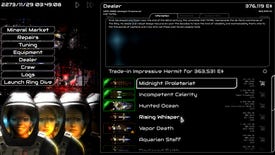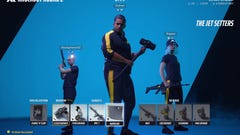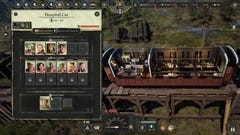ΔV: Rings Of Saturn review: turns asteroid mining lead into space game gold
For some of mankind
I can't remember the last time I struggled so much to get through a game.
You misunderstand. I'm not saying ΔV: Rings Of Saturn is a chore or grind. I found it hard because any time I boot it up, I can get lost for hours just playing it. Not trying to win, not following the story, not looking for (ugh) "progression". Just mining, exploring, idly drifting through the void. It is a game I don't want to exhaust because I'm enjoying it too much. I went back in "for a quick dive" twice during this intro.
It doesn't have Content. It's not one of those compulsive, manipulative forever games. You could barge efficiently through it, finding probably all its secrets and items as fast as possible. That wouldn't be wrong, exactly, but it's missing the point: this is a game to be savoured, not consumed.
That's partly because of its narrow focus. You're free to develop your own style, ethos, and methods, but Triangle Vee Colon Rings is very much about finding and mining ores in a detailed 2D physics sim. It sounds dry and dull, but just as an open world game can become sublime by making travel enjoyable, the part of space games I usually avoid entirely can become sublime by making the most mundane work challenging and satisfying.

You're a ring miner, captaining a chunky ship that's little more than a glorified bucket, built for one thing: plunging anywhere into the titular rings of Saturn. Deeper dives demand more time and fuel to get back, and are riskier, as friendly miners become rarer than outlaws with secrets and radical ideas, some of whom once called me "collaborator".
So, you'll stick to the shallows at first, any time you want an easy ride or to test a new configuration. There are fancier ships and heaps of equipment options, but many are sidegrades. The fundamentals are cracking open asteroids with a mass driver, then thrusting up and catching them in the cargo bay - and spilling them out again if you brake before it closes. Save up and you can microwave or laser (invisible until they intersect a resulting vapour cloud) spacerocks open instead. Retrieval drones and an endearingly wonky manipulator arm can be installed to pull the ores to you, but even these are only aids. This isn't levelling up, it's just another option, because they all operate imperfectly. Your tools work with you, not for you.
You might think that sticking mostly with the humble starter ship is me being my usual stubborn flint-axe wielding, never-seen-the-map-in-Skyrim self, but it's not. The ship that works for you is the best ship. The gear you like the feel of is the best gear. The way you like to mine, or eschew mining for its few side activities, is the best way to mine. Or, uh, eschew.
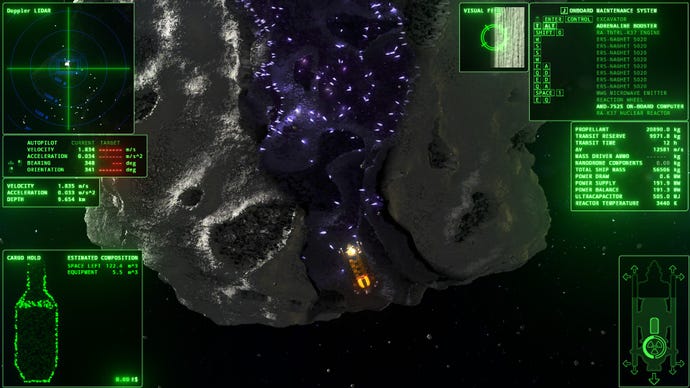
There are secrets out there. Derelict ships, escape pods, pirates to be a space cop at (who can be paid off, some even explain their motives). Your crew analyse ores, repair, and track ever-shifting points of interest, and occasionally turn up a micro-story you can follow in place of a single main plot. There are tensions with the unexplained anarchists, but it's not sidequests waiting in a list, not lore waiting to be put into your wiki. Rings of Saturn is, overwhelmingly, about the vibe.
Most equipment can be tweaked, partly to take advantage of its physics simulation and cool technical systems, but also to experiment - to customise, not optimise. There are multiple installable HUDs on top of the starter one that boots up on launch like an 80s computer, but is too busy for me. The OCP-209's parts rotate into position instead, but its circular cargo display and translucent sensor readouts are style over function - gimme that opacity, damn it. Another reflects objects, and wobbles when you spin too hard. The fancy flashy ones are, well, they're someone's thing.
"Your crew analyse ores, repair, and track ever-shifting points of interest, and occasionally turn up a micro-story you can follow in place of a single main plot"
One autopilot model I value solely because its display translates LIDAR readings into a circle that helps me differentiate rocks from abandoned ships without taking my eyes off the steering. The cheaper models don't have that, and the expensive ones loaded with features I don't need. It's not about the "tier" bullshit that's poisoned so much game design these last few years. This mid-grade autopilot helps me locate drifting treasures, which show up not as icons but vague directions, which is why so much comes of learning to read the initially overwhelming readouts. The fantastic music shifts and screen edges glow blue when something good is nearby, but "nearby" is a wide net in space, and you still need to follow what I imagine is a crewman's hunch about a weird sensor reading to actually find it. The edges also glow red when there's danger... or when you're flying backwards at 105 m/s through a dense asteroid field and rock music starts playing and you take your hand off the controls to revel in it, you maniac.
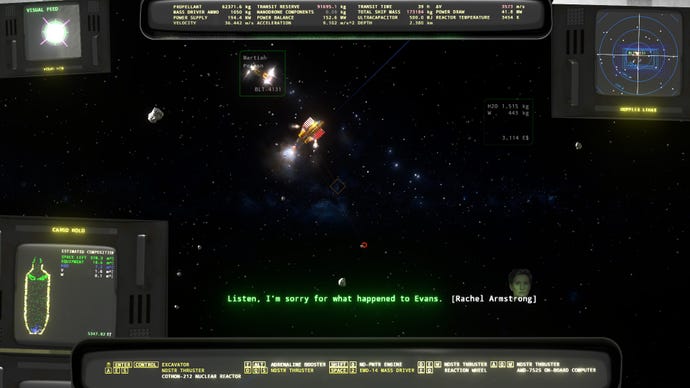
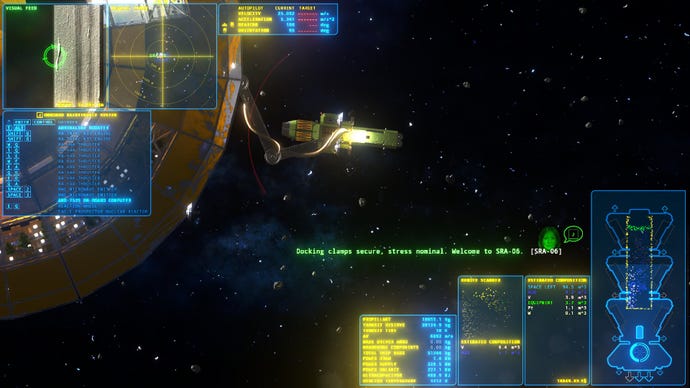
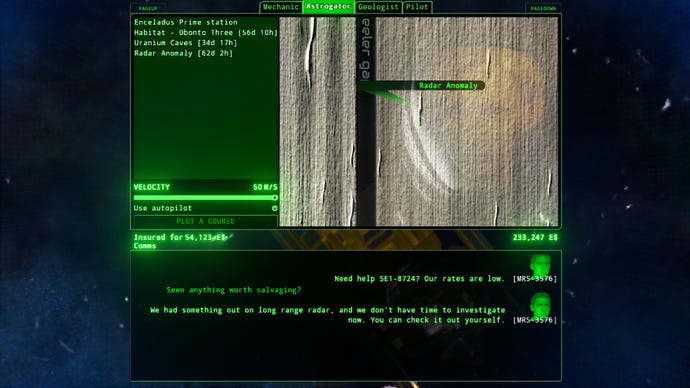
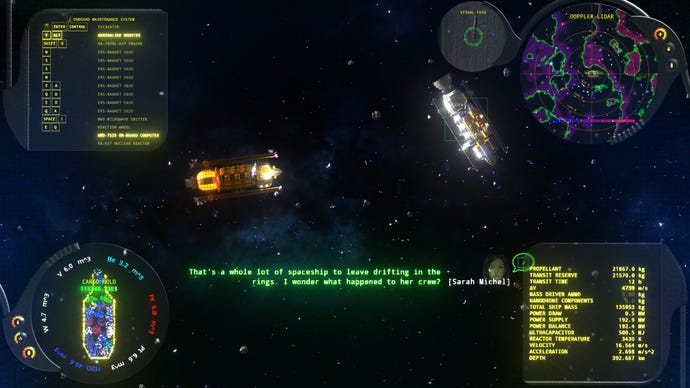
NPC ships don't make a sound unless they hit you with something. Crew will exchange vague, private messages with ships you hail (repeating some lines way too often, sadly). One pilot smuggled a cat on board. I salvaged one ship with a set of RA-K44 thrusters and double microwave beams, which proved so powerful it was impossible to mine with because I couldn't hold the damn thing steady. Despite its realistic physics and the intimidating numbers, so much of Rings is in the feel of a ship. You don't calculate; you steer. You don't automate away the basics, you choose the assists you enjoy
As a result, it doesn't hit me with grinder's remorse like a Minecraft. I'm not piling up money for its own sake, I'm trying out different ships and gear configurations, searching for derelicts, hailing strangers in the hope they'll reveal something interesting, and enjoying the dives for their own sake, then stopping when I've had enough. A dive could mean a mini adventure or a scary encounter, but more likely it will be a casual forty minutes of manually drifting and leisurely ore scooping punctuated by a couple of panicky near misses when my careless habits bear rockfruit much as they did in Hardspace Colon Shipbreaker, its friendly cousin. There are other things to do, but the heart of it is visiting the spectacular, desolate depths of space and revelling in sci-fi machines doing this incredibly mundane thing. It won't be for everyone for exactly that reason. But like its realistic lasers, it is expertly calibrated to hit those of us in its niche directly in the heart.
This review is based on a review build of the game provided by the publisher Kodera Software and Kurki.games.


